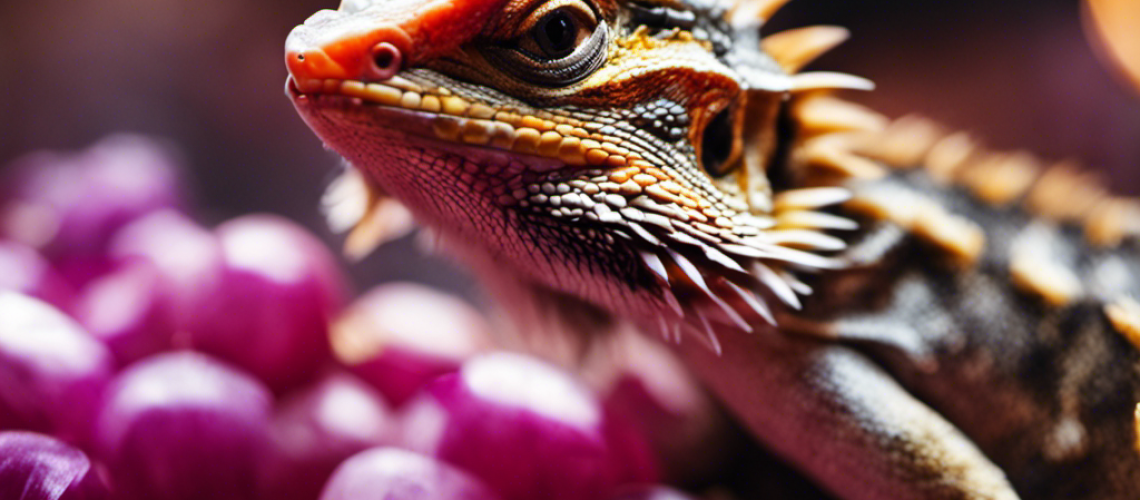Red onions are a popular vegetable that is widely used in cooking and garnishing. It is rich in vitamins, minerals, and antioxidants, and has been linked to potential health benefits.
This article will explore whether it is safe for bearded dragons to eat red onions, focusing on the nutritional profile of red onions as well as the digestive system of bearded dragons.
Additionally, possible risks and benefits associated with feeding red onions to bearded dragons will be discussed along with how to safely feed them this vegetable.
Key Takeaways
- Red onions contain beneficial nutrients such as Vitamin C, Vitamin B6, folate, manganese, and potassium.
- Bearded dragons can benefit from a varied diet, and introducing new foods gradually is important.
- Red onions can cause digestive issues and respiratory problems in reptiles, so precautions must be taken.
- Limited research is available on the benefits of red onions for bearded dragons, so monitoring for signs of digestive distress is necessary.
The Nutritional Profile of Red Onions
Red onions contain a variety of nutrients, including Vitamin C, Vitamin B6, folate, manganese, and potassium. Red onions are also a source of dietary fiber and essential minerals such as iron, calcium, and magnesium. They also provide digestive enzymes that can help the body absorb nutrients more easily.
Additionally, red onions have a high mineral content which helps to maintain healthy bones and teeth. Furthermore, red onions are rich in antioxidants which can help protect the body from free radicals that may be harmful to health.
Understanding the Digestive System of Bearded Dragons
The digestive system of reptiles such as the bearded dragon is adapted to process certain types of food. However, a growing body of research suggests that these animals can benefit from a varied diet and alternative foods. Such dietary variety increases nutrient intake and promotes overall health.
As such, it’s important to understand the digestive capabilities of bearded dragons before introducing red onions or any other unfamiliar food item into their diets. With proper guidance, owners should be able to provide their pet with a balanced diet that includes carefully selected alternatives.
Possible Benefits of Eating Red Onions
Consuming red onions may provide a range of potential health benefits. Red onions are rich in dietary supplements such as Vitamin C and flavonoids, which are known to boost immunity and reduce inflammation. Feeding techniques that incorporate this vegetable could potentially improve the overall health of bearded dragons. As with any dietary change for reptiles, it is important to introduce new foods gradually and monitor for signs of digestive distress. Although many reports suggest that red onions can be beneficial to bearded dragons, there is limited research available on the topic.
Possible Risks of Eating Red Onions
Ingesting red onions may present certain risks to reptile species such as bearded dragons. Red onions can cause digestive issues, and even respiratory problems if consumed by reptiles. Reptile owners must consider:
- Keeping red onions away from their pet,
- Storing them in a safe place,
- Avoiding contact with insects that may be on the onion’s surface.
Owners must take precautions when feeding their pets to ensure they are not exposed to potential harm. Careful consideration must be given to create a safe environment for their beloved reptilian companion.
How to Safely Feed Red Onions to Bearded Dragons
Care should be taken when introducing alliums to reptilian pets to ensure they are not exposed to potential harm.
When feeding red onions to bearded dragons, it is important to remember that some varieties of this vegetable can be toxic or cause digestive problems. Thus, only small amounts of onion should be given and the frequency of feeding should be monitored.
Choosing a variety that is safe for consumption is key in availing the benefits of red onions without endangering the pet’s health.
Frequently Asked Questions
What Is the Recommended Serving Size of Red Onions for Bearded Dragons?
When feeding bearded dragons, it is recommended to include a variety of fruits and vegetables in their diet. Red onions should only be fed in small amounts as part of this dietary variety, with no more than 1-2 tablespoons per day. As with other foods, it is important to follow a consistent feeding schedule for optimal health.
How Often Should Bearded Dragons Eat Red Onions?
Bearded dragons should be given red onions as part of their feeding schedule, but the portion size should be kept small. It is important to monitor their reactions and adjust the frequency accordingly. Red onions can be a healthy addition to their diet in moderation.
What Other Vegetables Can Bearded Dragons Eat in Addition to Red Onions?
Bearded dragons should have a balanced, healthy diet that includes other vegetables such as carrots, bell peppers, squash and sweet potatoes. Too many onions may lead to digestive issues for the dragon so it’s important to include other vegetables in their diet.
Are There Any Alternatives to Red Onions That Bearded Dragons Can Eat?
Bearded dragons should have a balanced diet to meet their nutrition requirements, including veggies. Alternatives to red onions include bell peppers, carrots, squash, and leafy greens like collards and kale. Incorporating these vegetables into the feeding schedule will help ensure optimal health.
Is There Any Way to Tell if a Bearded Dragon Has Eaten Too Much Red Onion?
Signs of red onion poisoning in bearded dragons include digestive upset, vomiting, and diarrhea. Owners should watch for these symptoms and seek veterinary care if they occur.
Conclusion
While red onions may provide some potential nutritional benefits to bearded dragons, their digestive systems are not equipped to handle large amounts of the vegetable. To ensure that bearded dragons receive any possible benefits from eating red onions without suffering adverse effects, only small amounts should be fed in conjunction with a balanced diet and monitored for any negative reactions.
It is best to consult a veterinarian before introducing red onions into an animal’s diet.






